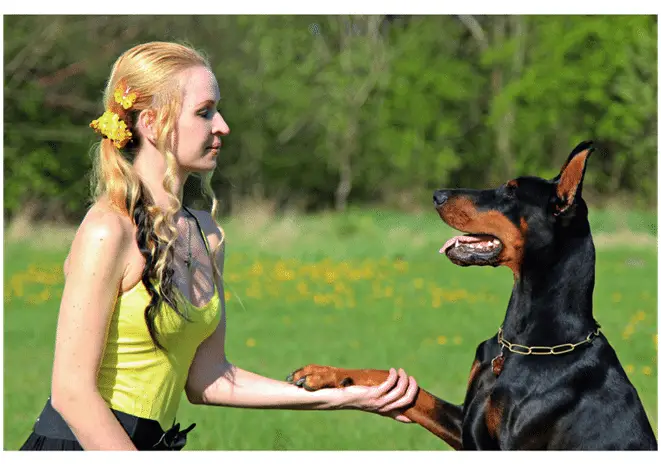If you own a Doberman, you may have noticed that your dog likes to lean on you. We explore the reasons behind this behavior and what it means for your Doberman’s relationship with you.
Doberman Pinschers are considered a “leaning” breed, amongst other dog breeds. Loyalty is a trait they will express to their owners. They are protective, guard dogs who lean up against you as a sign of closeness and as a way to say they love you.
If you own a Doberman, you may find a tight bond between you two. In addition to leaning, they will show affection towards you by simply placing their head into your arms. Here are some ways Dobermans lean on you, the reasons why they do so, and when to be concerned.
Why Does My Doberman Push His Body Up Against Me?
Dobermans are one of many dogs with protective and guarding instincts. Because they are considered a “large” breed, they tend to lean rather than jump on top of you to express their loyalty to you.
In addition, they could be expressing some concern or behavior that you may not understand. Here are some common reasons why Dobermans push up against you and what they could mean.
The Doberman Pinscher is a medium-large dog breed with an average weight of about 60 to 80 pounds. They are known as protective dogs who tend to defend those around them. Dobermans express their love and loyalty towards their owners and family, so when he pushes his body against you or sits on you, he shows that he feels safe around you.
They Want To Stay Warm
Dobermans tend to have very smooth, sleek fur. Their coat is relatively short and closer to their skin. With that being said, they don’t do so well when it’s colder.
Even though they have a double coat, their fur is not too resilient to cold weather conditions. During the colder months, you may find your Doberman snuggling or leaning up against you to keep themselves warm.
They Want Close Contact With Their Pack Leader
Like many dog breeds, many claim them to be social pack animals. Dobermans can be very loyal to you as their owner and desire someone who can be strong-willed as their pack leader or the “alpha.” In other words, they need someone who will take charge when sudden occurrences arise.
When you are the pack leader, they will respect you, and they will place their trust in you to take care of them. The Doberman enjoys physical contact, and when they lean on you, they respect you as their alpha.
They Want To Show They Love You

Dobermans are one of many dog breeds considered “velcro” dogs. Although they have many ways to show doggy affection for you, leaning is one of the most common ways they will say, “I love you.” Dobermans can be very clingy and have a tendency to stick by your side, even when you least expect it.
Moreover, Dobermans will express their tight bonds with you by using your neck or body as their headrest or sleeping on or beside you. If your Doberman does lean on you, you may be astounded by his weight pressing against your legs, which may cause you to lose your balance!
At the most random times, he may sit down beside your legs to show that he loves and cares about you.
They Are Afraid Of Something
The Doberman is a friendly dog breed, and if properly trained, they can be very social and eager to meet new people. Nevertheless, some Dobermans can be very reserved with strangers due to their protective instincts.
If you own a shy Doberman, they may lean on you when they feel anxious, especially if they encounter someone unfamiliar.
They are very alert and have a strong awareness of their surroundings. When they are afraid, they may lean or use you as a form of security if they are frightened by something.
This is another way of showing they trust you, and it also eases their anxiety when they seek your touch.
Moreover, having fear is more common if you have a puppy. Once a Doberman develops into adulthood, their fearless nature tends to kick in.
They May Want You To Move Or Be Closer To You
Like many dog breeds, the Doberman may lean on you and take up space on your couch or bed. If you own a Doberman or are curious about owning one, you may find that they are very clingy towards you and constantly seek physical affection. They want to feel as close to you as possible, even when you’re asleep.
Some may consider Dobermans “bed” or “couch” dogs. Although they are big, they can lean on you to move you when cuddling beside you. Furthermore, they tend to take up a lot of space.
If you feel that your Dobie is leaning against you to move or take up space on your furniture, you can incorporate proper discipline to reduce any occurrences.
They May Want Something From You
We know how important it is to give our dogs attention as dog owners. Many dogs tend to poke their nose, whine, and even lean on you when they want something from you.
Dobies are known as “needy” dogs because they tend to keep their focus on their owners at all times.
When he leans on you, he may want you to pet him, feed him, play with him, or take him outside. Another way he may lean on you is by nuzzling his head under your arms or rubbing his body against you.
This is another form of leaning when they want something from you.
He Wants To Show His Dominance Over You
Dobermans may make physical contact as a sign of dominance over other canines and even their owners. It is important to train your Doberman properly and show them that you are dominant as their pack leader.
Dominance in dogs is not uncommon. While many people perceive dogs that lean up against their owners as a sign of invading one’s territory, that is not always the case.
Often, when your Doberman decides to lean on you, it’s practically harmless and nothing to worry about.
If you notice dominance in your Dobie, check for any signs of growling, biting, aggressive behavior during playtime, or possessiveness.
They Have Separation Anxiety

Separation anxiety is a behavioral issue some dogs can develop. Because Dobermans are clingy, needy, highly protective, and loyal to their owners, they may likely develop separation anxiety.
A Doberman with separation anxiety can be overwhelming and take lots of work to overcome.
As previously stated, Dobermans love to stick by your side. But they may develop a sense of fear when they are not around you.
Your Doberman Pinscher may express emotions or anxiety when you leave the house or if they are alone for long periods. Their symptoms of anxiety can occur just hours or even minutes after leaving.
A typical sign of separation anxiety can include any of the following:
- Destruction in chewing – may chew on doors, door frames, furniture, or walls.
- Urination/defecation
- Excessive whining, barking or howling
Sudden life changes can trigger your Doberman to develop separation anxiety, such as:
A change in any of the following:
- the family’s schedule – this could mean your work schedules or changing jobs.
- in the family, such as a loss or the absence of a family member.
- in their surroundings, such as a new home. Dobermans may be unfamiliar with new scents or surroundings, which can cause them stress.
- Abandonment/Isolation
When To Be Concerned About Your Doberman Leaning On You
Leaning is generally harmless in dogs, but it may signify a cause for concern.
As the Doberman breed is very clingy, their tendency to lean may cause an issue for you. This is especially the case if you do not want this attention.
If leaning does cause some concern, you can teach them commands to let them know. Also, you don’t always have to reward their leaning if it’s something you don’t desire.
Moreover, Dobermans are pretty large in size. When they lean on you, it can cause you to lose your balance, especially if you are lightweight.
If you have smaller children, leaning may put them at risk of injury if they are unaware of the behavior. It is recommended to supervise your Doberman around children.
Dobermans are very loyal and affectionate, and because of their protective nature, they will lean on you because they trust you. Although they are clingy dogs, they enjoy seeking your attention and knowing they feel safe around you at all times.


